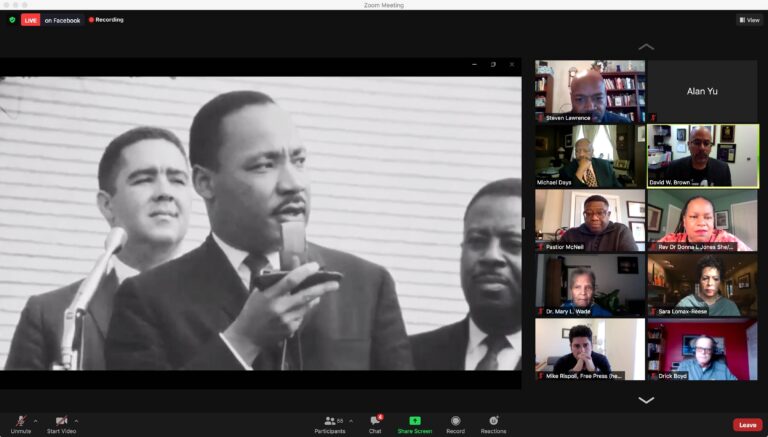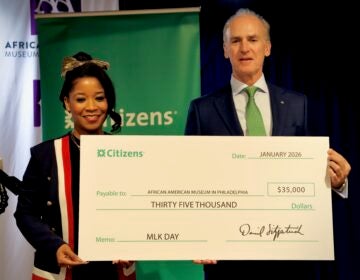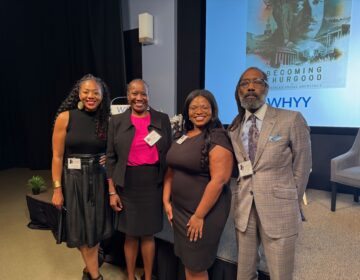What people fighting for change today can learn from MLK’s use of media
Dr. Martin Luther King Jr. used the media to advance the civil rights movement. Black media leaders in Philadelphia and beyond have ideas on how to continue his tradition.

Dr. Martin Luther King Jr. was a master orator, and an iconic presence on TV and radio.
“He turned out the press … because he was magnetic,” said Michael Days, veteran editor and former vice president for diversity and inclusion at the Philadelphia Media Network. “(King) was kind to the camera, the camera was kind to him, and he believed in, his movement believed in doing much of their work … in the light of day.”
King understood how powerful radio was for the civil rights movement, said Sara Lomax-Reese, president and CEO of WURD Radio, the only African-American owned talk radio station in Pennsylvania. Lomax-Reese pointed to a speech King gave to the National Association of TV and Radio Announcers in 1967 where he said “for better or for worse, you are opinion-makers in the community and it is important that you remain aware of the power which is potential in your vocation.”
But Lomax-Reese added that unequal coverage, and lack of representation among people who work in the media contribute to the very issues of race relations King was fighting against. She cited the 1968 Kerner report commissioned by President Lyndon B. Johnson’s National Advisory Commission on Civil Disorders, which described the country as moving towards two societies: “One black, one white — separate and unequal.”
King himself, and the civil rights movement, were deeply unpopular at the time of King’s “I Have A Dream” speech at the March on Washington. The FBI considered him a national security threat and signed off on intrusive surveillance.
Days and Lomax-Reese were part of a panel organized by WHYY and NewCORE to discuss how to learn from and expand on King’s use of media to promote social change today.
Building anti-racist media today
Problems in media representation remain unsolved more than 50 years after Dr. King’s assassination and the publication of the Kerner report. On Monday, hundreds of public radio employees and some organizations signed an open letter started by radio host, author, and professional speaker Celeste Headlee demanding reform and an anti-racist future in public media.
“Black folks are like the conscience of the country, because we really have no choice,” Lomax-Reese said. “What I’ve known, and what we’ve seen since 1827 when Freedom’s Journal was created, the first Black newspaper was created, Black people were advocating for our very humanity, for our very lives, and so I think that’s the tradition of Black media in general is that we have to speak truth to power because we are still seen as less than human.”
One solution is to continue promoting marginalized voices, to have people “who maybe don’t consider themselves journalists commit acts of journalism,” said Mike Rispoli, new voices director at Free Press, an organization working towards change in media ownership and access. For instance, he said people can document protests, or share information on social media to keep their communities informed.
Another solution is to advocate for changes in government policy and media ownership. For example, Lomax-Reese pointed to how the 1996 Telecommunications Act allowed a company to buy multiple stations in a single market, which iHeartMedia took advantage of to grow from 40 stations to 1,240 by 2002.
“I’m personally annoyed with iHeart because they just launched something called the Black Information Network … programming it with Black news, but it’s completely white-owned and ownership really matters.”
Laura Garbes, a Ph.D. student in sociology at Brown University, wrote her thesis on how NPR became such a white organization. She pointed out that the precursors to NPR, the National Association for Educational Broadcasters (NAEB) and later the National Educational Radio Network (NERN) had lobbied the Federal Communications Commission to reserve channels for noncommercial radio. Those stations were primarily owned by white-dominant universities and were managed by white men who drew on their predominantly white student body to recruit trainees, Garbes writes.
Finally, Kendra Van de Water, executive director of Youth Empowerment for Advancement Hangout (YEAH) which works with Philadelphia teens who have witnessed or engaged in violence, said her group changes the narrative by telling a different story than what people may expect. For instance, she said that when they bought a two-story property for a headquarters and community center in West Philadelphia last year, some people who weren’t familiar with their work thought they were bringing violent criminals to the neighborhood.
“We elevate young Black teenagers who … come from the hood,” Van de Water said. “We are very intentional about how we portray ourselves.”
“We have to do our own media coverage, as we like to say, and show people the truth of what we’re doing.”

Get daily updates from WHYY News!
WHYY is your source for fact-based, in-depth journalism and information. As a nonprofit organization, we rely on financial support from readers like you. Please give today.





